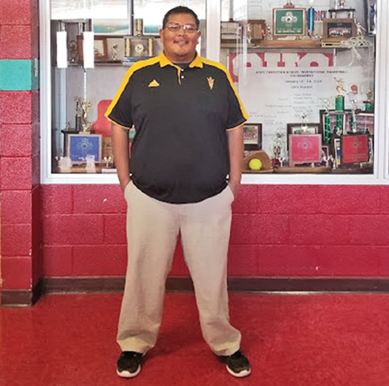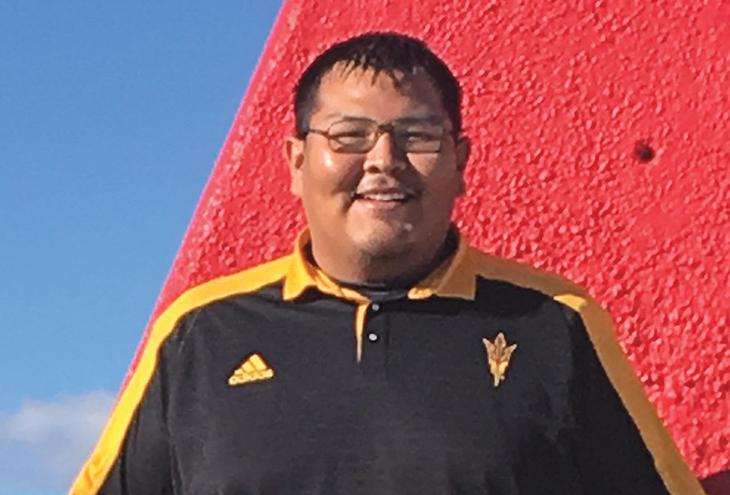I’m the first in my family to attend university. Early on, my parents told me how much school would help me in the future, but I never really thought of going to college after high school. I thought I would find a job somewhere around Shiprock, N.M., and maybe take a few classes at San Juan College, a local community college. It wasn’t until my senior year in high school that two Teach for America teachers opened my eyes to my full academic potential. They challenged me in AP Calculus and Honors Chemistry and helped me apply to several colleges and scholarships. These teachers showed me the need for more education.
My family has always been supportive of me and the path I choose. I attended K–12 on the Navajo Nation in Shiprock, graduated from Shiprock High School, and chose to attend Arizona State University. My family provided me with tons of emotional support. Having me be the first to go to college in my family made my grandparents, parents, uncles, and aunts very proud — but it was my grandparents who supported me the most. Their words of encouragement were enough to keep me going during challenging moments.
As a first-generation college student, I didn’t have family members to look to for advice about college. There was so much going through my mind on my first drive down to ASU and during my freshman year. It was all new to me. I went from a school that was 99 percent like me to a school that was less than 1 percent like me — a life-changing experience. Luckily, a mentor through the ASU American Indian Student Support Services guided me through the first year.
One of the biggest challenges I had entering college was paying for it all. Both my parents were unemployed at the time. My mom was living with friends, and my dad and I were living with my grandparents. We were low on cash, and I was afraid I would not have enough money for food and housing. But I received the maximum Pell Grant, and with Chief Manuelito, American Indian Services, and university scholarships, I had enough to barely cover the costs.
It was a struggle each day, and so many times I wanted to give up. There were times when I would eat only once a day because I was broke or low on cash. Every time I considered quitting, I thought of my grandparents and how disappointed they would be. During tough times, I thought back to what they would tell me when I was back home. They would always tell me to never give in to all the negativity that’s everywhere these days.
I constantly reminded myself that I’m the first in the family to go to college. What would I be telling my little cousins, who are looking up to me, if I were to drop out? I always used the image of me walking up the aisle to receive my diploma as another motivation to keep going. So no matter how bad my day was, I stayed positive and kept my sights on the finish line: being the first in my family to graduate from college. And I did that. I graduated in May 2016.
At ASU, I thought about studying engineering but decided on biochemistry because it’s interesting and challenging. I chose this major largely thanks to my high school chemistry teacher, one of the Teach for America teachers who mentored me and showed me how much fun chemistry can be. I enjoyed his class and could clearly understand the material. Also, I’m strong in math and science so I wanted a degree that’s a mixture of both. I spent many nights staying up late reading and doing homework. In the end, it was all worth it.

It wasn’t until my senior year in high school that two Teach for America teachers opened my eyes to my full academic potential.
I also took a few classes in American Indian studies, which expanded my thinking and made me want to make a difference in the lives of young American Indian students, specifically my people. That’s one of several factors that led me to join Teach for America and come home to teach. I want to empower students in my community with education and knowledge as well as be a role model and mentor for them.
My advice to students who hope to go to college is to stay focused and committed to your studies. Never fall behind, and attend every single class or you’ll miss important information. Stay away from all the negativity that surrounds college campuses. Stay in constant contact with family to help keep you strong. Stay motivated and always remember why you are there. Most importantly, I would also tell them to use the education from college and bring it back home by mentoring, tutoring, and even teaching students in their communities.
After I graduated from ASU, I got into the Teach for America program through AmeriCorps. Not only did I come back home to Shiprock, but I also get to teach in my old high school. I teach Algebra 1 and 2, Geometry, Financial Literacy, and AP Calculus. Go Chieftains! Now that I’m in my second year of teaching, I’m starting to figure out what all my experience is leading toward. I enjoy teaching and the feeling you get when students say, “I’m finally starting to get this.”
My plan is to continue teaching at SHS for the next five to 10 years. But you never know — I could teach for longer than that. I enjoy every single day with my students. Once a Chieftain, always a Chieftain!
My ultimate career goal is to make a difference in the lives of the young students in my community. I want to be a role model and a mentor for them and show them that if they stay focused, determined, and motivated, they can achieve and be whatever they wish. I want to make this connection with as many students as I possibly can, as an educator.













